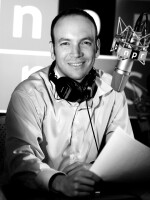STEVE INSKEEP, host:
Here's a question for the FBI. How did classified documents from one of the nation's leading nuclear weapons laboratories end up in a private home? The material is from the Los Alamos National Laboratory in New Mexico. It turned up after police searched a trailer park as part of an investigation that had nothing to do with Los Alamos. Many details of this story are still unclear, but NPR's David Kestenbaum has been sorting out what's known so far.
DAVID KESTENBAUM: I spoke with a government source who'd been briefed, but spoke anonymously because of the investigation - who said that police in New Mexico on Friday conducted a drug raid on a house in connection with the Methamphetamine investigation, and they found in the house what appeared to be classified documents.
So they notified the FBI, and the documents have been traced to a woman who is not a scientist, but a woman who works or worked at Los Alamos National Laboratory, which, of course is one of the government's nuclear weapons lab and known as the birthplace of the bomb.
INSKEEP: So the government story is it was completely random. They just happened upon this highly secret stuff.
KESTENBAUM: That they were, in fact, looking for drugs. And it was done by the local police.
INSKEEP: What kind of classified information was this? When you think Los Alamos, you immediately wonder if it has something to do with making a bomb.
KESTENBAUM: It's unclear. One of the things they're doing now is reviewing the documents to make sure these are not things that, say, were classified seven years ago, but has since been declassified.
It's possible, given that this is Los Alamos, that these could be bomb data. Or it's also possible they could be more low-level, classified material. I'm told there's not just one document, but there are actually quite a few that were found.
INSKEEP: Is there any indication whether the person who had this material intended to sell it to someone?
KESTENBAUM: The person I spoke with said there's no indication that this woman, currently, intended to sell it. But she did not have the sort of job where it would have made sense for her to be bringing classified material home.
So it's hard to understand why the material was at the house. I mean, classified documents are usually the sort of things that are kept in a safe, and people who work on them at the lab or working behind big iron gates with guards with guns. So it's not the sort of thing you want to leave on your coffee table at home.
INSKEEP: What kind of work is done behind those gates these days?
KESTENBAUM: It's still one of a couple of places where you have people who know how to design and build bombs. The lab is a gigantic place. It's like 36 square miles. It's up in the mesas of New Mexico. They've over 9,000 employees. And they're supposed to certify, basically, that the nuclear stockpile functions and is reliable. They do a whole host of other things.
It's run by the University of California since in the Manhattan Project days and up until, actually, the end of 2005, when, because of some perceived trouble, that the lab was put under new management.
INSKEEP: Remind us what that perceived trouble was. Some of it, over the years, has had to do with classified information.
KESTENBAUM: A lot of it did. Well, you may remember the Wen Ho Lee case, a scientist who was, early on, made out to maybe be a spy. In the end, he just pled guilty to one count of mishandling classified data.
But there are other incidents. There were two computer drives containing classified material that disappeared. There's a big search for them, and they turned up behind a copying machine.
In 2004, it looked like two other computer drives had disappeared. But then it turned out they never existed and there was a problem with the accounting system. So it's quite serious, and the lab has really tried to keep things like hard drives under very, very tight control.
And, if it turns out that these were something things - something that was on the CD or a hard drive, then the lab is going to have to answer those very difficult questions all over again.
INSKEEP: That's NPR's David Kestenbaum. David, thanks.
KESTENBAUM: You're welcome. Transcript provided by NPR, Copyright NPR.







